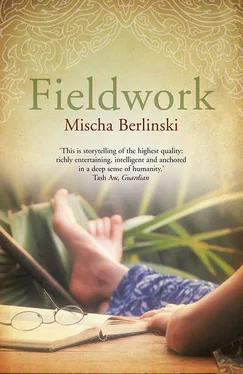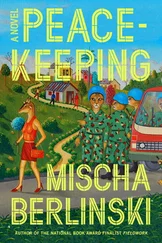Tom and I took to meeting in the mornings at an American-style diner in the center of Chiang Mai specializing in big breakfasts. The place was air-conditioned, with large plate-glass windows, hanging ferns, pink vinyl booths, and neat, uniformed waitresses with name tags in English and Thai, who would sidle up to our table and be shocked to find
*In addition to my talks with the Walkers and Tom Riley, my understanding of missionary life on the Tibetan-Chinese border and in Burma has been immeasurably enriched by the extraordinary memoirs of the late Gertrude Morse, The Dogs May Bark: But the Caravan Moves On (Joplin: College Press, 1998).
Tom address them fluently in the vernacular. He was, after all, a professional linguist. He'd order himself four eggs, double bacon, hash browns, and a pot of hot coffee, which by Thai standards is simply a mountain of food, and I would order a short stack of pancakes. The restaurant was filled by nine with the expat retirees, who left their young Thai wives at home and spent the long mornings lingering over coffee and the Bangkok Times , contemplating how to pass another long day of self-imposed Oriental exile. Sometimes Tom and I would stay talking all through the morning, until the lunch hour arrived and the place filled up with hip young Thais who thought of an American-style diner as ethnic dining, a taste of the exotic West.
In 1934, the Salween River, which tumbles down in white water out of the high mountains of Tibet, overflowed her boundaries, together with her tributaries, and the river valley where the Walker family lived and tended to the spiritual needs of the Dyalo people was flooded. The great river rose in only hours, and everything was lost but what the Walkers had on their backs. The first and only dictionary of the Dyalo language was carried off downstream, floating beside Raymond Walker's first translation of the gospels into Dyalo and the family Bible in which the Walker genealogy had been recorded. So when I asked about the family before old Raymond Walker, the Walkers of today just shrugged and waved their hands: the past was downstream, lost in the flood.
What they knew was this: they were of Scotch and Irish stock and maybe a little German — nobody really knew anymore — and they had always been wanderers. Raymond Walker was only five when his family left Sayre, Oklahoma, in 1901 and staked a claim in the Indian Territory near Tulsa, but his parents hadn't been born in Sayre, and his grandparents had been born only God Himself knew where to the east, the generations one after another in constant motion westward. The Walkers had drifted all through the nineteenth century, all across a huge continent, and probably would have kept drifting if first they hadn't run out of empty country, or if the Great War hadn't come. But the war did come, and Raymond Walker was the first Walker in a very long time to go eastward, to northern France, where he served as a medic, and when he came back to Oklahoma, he no longer wanted to teach school, which had been his childhood ambition.
Raymond Walker's first idea when he came home after the war was to start a business breeding registered, pedigreed Dalmatians. But an epidemic of distemper made the dogs weak and trembling in their paws and thin, and they had to be shot, and Raymond lost all the money he had invested in a beautiful bitch and stud. Raymond figured that the animals' deaths were a sign from God lest Raymond grow distracted from the plan that he had formulated in northern France. Then Raymond proposed to take his new wife, a pretty nurse named Laura, on a mission to convert the Tibetans. Nobody in Tulsa thought this a particularly fine idea: of course the Tibetans needed saving, same as everyone else, but Raymond and Laura had responsibilities in Tulsa. Raymond's father, who ran a grocery store, was ailing, his mother was always in tears, and his brother drank. And round-faced, giggling Laura Walker, they said she wouldn't last a month in China: she was pale and sickly as a child, and couldn't tolerate even a feather out of place. They asked: Why would Raymond Walker of all people want to be a missionary, anyway? It was true that when he was eleven he had won a medal for having memorized more Scripture than any other boy in town, but someone in town won that medal every year, and you didn't see the others heading off to China . The people in Tulsa wondered if Raymond had got religion along with Laura, but at the wedding Laura's folks were mystified too: they had thought it was all Raymond's fault and were shocked to find that the Walkers seemed like such normal people, if maybe a little high-strung. But Raymond and Laura were of age, no one could stop them from heading off— in truth, no one really tried — and Raymond's experience as a medic and Laura's experience as a nurse made them attractive as volunteer missionaries. Their applications to the United Missionary Society were accepted, and they left for China in the fall of 1921, as very junior members of a missionary expedition to the Sino-Tibetan border, under the leadership of the celebrated Dr. Morris Chester, member of the National Geographic Society and one of the very few white men to have penetrated the interior of the closed kingdom of Tibet. Not long after the steamship Maiden of the East left San Francisco for Yokohama, the first stage in what would be a six-month voyage to the Tibetan frontier, Raymond and Laura Walker conceived their son Thomas.
Every morning on the Maiden of the East , Raymond and Laura, habituated to country hours, rose at dawn and sang hymns together, a pleasure they would indulge through good times and terrible until separated by Laura's death at the age of eighty-six; then, closing the hymnal, they picked up the Bible and read together, book by book, as the screws of the ship took them farther and farther from Tulsa. Dr. Chester prepared them for the hardships of inner China, delivering long lectures in his stateroom which emphasized equally the majesty of Chinese culture and the savagery of Chinese life; Mrs. Chester, a large, almost square woman dressed in the Victorian style with pince-nez and a hat embroidered with silk flowers, took Laura Walker aside every morning to discuss the particular problems of feminine hygiene and etiquette in a tropical climate. Dr. Chester then spent an hour offering rudimentary instruction in the Chinese language, and then another hour in Tibetan, so that after twenty-three days at sea Raymond and Laura could recite the Lord's Prayer in both tongues. Dr. Chester remarked to Mrs. Chester that the Walkers had an excellent ear for the tones. Every night, Raymond and Laura danced in the ship's ballroom. When the ship stopped in Japan, the Walkers ate in a restaurant where they sat on the floor, and they visited a Buddhist temple where they saw people worship idols for the first time. Dr. Chester explained that this was only a foretaste of the darkness of spiritual life on the Tibetan border. The Maiden of the East stopped in Shanghai, and the Walkers saw the junks on the Yangtze River, so many hundreds with their sails unfurled, each manned by hundreds of coolies, and Raymond calculated that the floating population alone in Shanghai Harbor was greater than the population of Tulsa, perhaps more than all the American men dead in the war.
"And none of these people are Christian?" Raymond asked Dr. Chester, standing on the deck of the ocean liner. "None of them know?" The idea staggered the imagination. He imagined the population of the entire world spread out along the length of a teetering balance. Before, he had supposed that the job of the missionary was to hunt out the unsaved remnants of humanity awaiting salvation; now he realized that the balance tilted heavily toward universal damnation. It was an awesome thought. To Raymond, heathenism was like some terrible but easily cured disease, and the notion that the healing medicine was warehoused in his own land, stored away in huge forgotten boxes, crates, and vials sufficient to change the lives of millions, while here, no one even knew there was a cure — this was a thought so disturbing that Raymond had to pace along the deck.
Читать дальше












